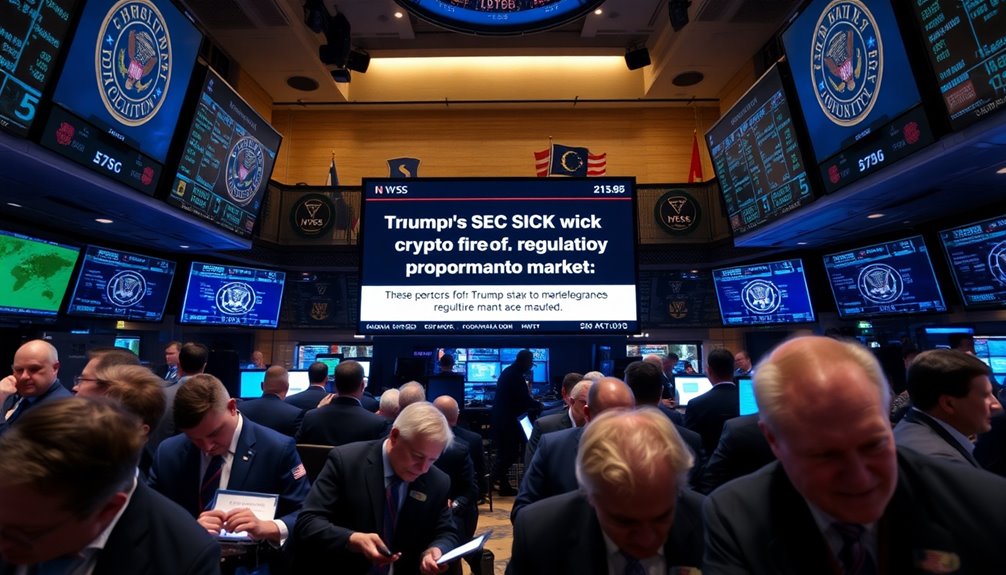The election of former SEC Commissioner Paul Atkins as the new SEC chair could revolutionize cryptocurrency regulation, ushering in a more crypto-friendly era. You can expect the SEC to shift from an enforcement-heavy approach to one focused on collaboration and guidance, potentially halting actions based solely on registration violations. This could introduce safe harbors and regulatory sandboxes to foster crypto innovation, while also attracting more crypto businesses to the US. With consistent global regulations and strategic national positioning of cryptocurrencies, you may see increased institutional adoption and a more stable, innovative digital asset landscape. Continue reading to dive deeper into what this regulatory shift means for you.
Key Takeaways
- The expected appointment of Paul Atkins, a crypto-friendly former SEC commissioner, could shift the SEC's regulatory approach from enforcement-heavy to a more collaborative, guidance-oriented model.
- Deregulation and innovation are anticipated, with the potential introduction of regulatory sandboxes and safe harbors to enable crypto projects to develop functional, decentralized networks.
- The crypto-friendly SEC leadership could enhance the U.S. appeal for crypto firms, attracting global crypto businesses and fostering international collaborations.
- Consistent regulations will promote innovation and competition in the crypto sector, reducing non-compliance risks for businesses and ensuring accurate information for investors.
- The proposed Presidential Advisory Council on crypto could influence the SEC's regulatory approaches, facilitating a more informed and collaborative regulatory environment for the crypto industry.
Paul Atkins: The Crypto-Friendly SEC Chair

Paul Atkins, a former SEC commissioner, has emerged as a potential crypto-friendly candidate for the SEC chair position. With his extensive legal and regulatory experience, including a stint at the prestigious Davis Polk & Wardwell law firm, Atkins is well-equipped to navigate the complexities of the financial landscape. During his tenure at the SEC under President George W. Bush, he played a pivotal role in shaping corporate governance, shareholder rights, and access to capital markets.
Atkins is known as a staunch defender of digital assets and a vocal advocate for the crypto industry. He's outspokenly supportive of the development of clearer cryptocurrency rules and reduced regulatory burdens, favoring a balanced approach that fosters innovation while protecting investors. The appointment of Atkins is expected to signal potential regulatory changes for the cryptocurrency industry. Should Atkins be appointed as SEC chair, he's expected to reverse the "enforcement-focused" model of the Gensler era, potentially leading to the establishment of clearer guidelines for the crypto industry and securing a greater advantage for the U.S. in the global crypto market competition.
Deregulation and Innovation in Crypto Sector

A more crypto-friendly SEC could pave the way for safe harbors and regulatory sandboxes that enable innovation in the crypto sector. These measures could give crypto companies more breathing room to test new products and services without fear of aggressive enforcement. As a result, the crypto industry may witness greater entrepreneurial activity and the emergence of novel use cases within a more permissive regulatory environment. Enhanced transparency allows investors to make informed decisions, with a focus on protecting against bad actors.
Safe Harbors for Crypto
Regulatory clarity remains essential for the crypto sector's growth and innovation. Safe harbors provide crypto projects with the legal certainty needed to thrive. These provisions balance investor protection and innovation by exempting developing networks from immediate securities law compliance.
The proposed Token Safe Harbor 2.0 offers a 3-year grace period, requiring only semi-annual updates and an exit report. This framework allows projects to focus on building functional, decentralized networks rather than immediate regulatory hurdles. The exit report requirement at the end of the three-year period aims to assess the network's decentralization.
Safe harbors encourage:
- Reduced regulatory barriers, enabling crypto projects to prioritize development.
- Maturation of decentralized networks without the burden of registration.
- Industry involvement in shaping practical, effective regulations.
- Balanced investor protection and innovation to foster the crypto sector's growth.
Ultimately, safe harbors catalyze the crypto industry’s potential, empowering innovators to navigate the regulatory landscape and bring transformative technologies to fruition. By providing clear guidelines and protections, these safe harbors encourage investment and development, fostering an environment ripe for groundbreaking advancements. As a result, many individuals are seeking ways to contribute to this evolving sector, exploring secret crypto jobs to pursue that align with their skills and interests. This surge in talent not only enhances the industry’s growth but also ensures that innovative solutions can emerge to address real-world challenges.
Regulatory Sandboxes Enabled
One innovative approach regulators have embraced to foster cryptocurrency and blockchain innovation is the implementation of regulatory sandboxes. These sandboxes provide a live-like testing environment where companies can ascertain regulatory compliance and security checks for their crypto and blockchain projects. They facilitate cross-border dialogues between regulators, supervisors, and companies, increasing legal certainty for innovative solutions.
Through thorough testing, companies can identify and address regulatory challenges, while regulators gain the technical expertise necessary to draft practical regulations. Sandboxes support the development of new technologies by providing a safe space for testing without immediate consequences. They've been implemented globally, from Spain to the UK and the EU, adapting to local frameworks.
While sandboxes offer benefits like real-world testing and regulatory feedback, they also face limitations. Their duration is often limited, and they may only cover specific aspects of the crypto industry. Technical compliance issues and difficulty in setting timeframes can also be challenges. Nevertheless, the adoption of crypto sandboxes is expected to increase as the industry continues to grow.
Balancing Investor Protection and Crypto Advancement

Striking the right balance between investor protection and fostering crypto innovation remains a delicate challenge for policymakers. Trump's incoming SEC leadership is poised to take a more accommodating approach, but not without risks. While deregulation may spur growth, it could also expose investors to greater vulnerabilities.
The key will be to:
- Implement tailored rules for digital assets that account for their unique, decentralized nature.
- Streamline the SEC's "case-by-case, coin-by-coin" litigation strategy to provide clearer regulatory guidance.
- Collaborate with industry leaders to develop self-regulatory frameworks that uphold investor safeguards.
- Prioritize preventing fraud and market manipulation rather than stifling innovation through heavy-handed enforcement.
The anticipated dismissal of ongoing lawsuits against major exchanges may provide a fresh start for the crypto industry to work collaboratively with regulators.
Regulatory Clarity for Digital Assets

Providing clear guidelines on the classification of crypto assets as securities is vital for reducing the current ambiguity that has led to regulatory actions against crypto companies. This will distinguish between crypto assets that are securities and those that are not, aligning with industry feedback to guarantee the guidelines are practical and enforceable.
Jurisdictional clarity is also important, defining the scope of SEC jurisdiction over different types of crypto assets and clarifying the differences in regulation between tokens and NFTs. This will guarantee consistency in regulatory treatment across various crypto products, preventing overlapping or conflicting regulations from different agencies and facilitating compliance. Establishing clear guidelines on the regulatory treatment of different crypto asset types is crucial for providing legal certainty.
Furthermore, establishing safe harbors and regulatory sandboxes will encourage experimentation and development within a controlled regulatory environment, fostering an ecosystem where crypto companies can innovate while guaranteeing investor protection. A cohesive regulatory approach, coordinated with Congress and other agencies, will support the growth of the crypto sector while maintaining regulatory standards.
Collaborative Approach to Crypto Regulation

Recognizing the need for a more collaborative approach to crypto regulation, regulators are now emphasizing inter-agency cooperation and industry engagement to develop a thorough framework. The proposed Financial Stability Oversight Council (FSOC) oversight, reconstituted CFTC-SEC Advisory Committee, and coordinated government reports underscore a "whole-of-government" effort to address the unique risks of cryptocurrencies.
This collaborative spirit extends to the industry as well. Regulators are shifting towards a guidance-oriented model over pure enforcement, and are exploring regulatory sandboxes to foster innovation. As SEC Commissioner Hester Peirce envisions, this approach aims to cultivate a more constructive regulatory environment through direct industry input. Hester Peirce advocates for clearer cryptocurrency regulations to provide legal certainty for crypto enterprises through aligned regulations.
Importantly, this collaborative mindset extends globally, as regulators recognize the cross-border nature of crypto. Key priorities include:
- Forging international alliances to tackle cross-border crypto crimes.
- Establishing uniform compliance standards across jurisdictions.
- Ensuring global market integrity through coordinated oversight.
- Providing legal certainty for crypto enterprises through aligned regulations.
Reversing the Enforcement-Heavy Crypto Crackdown

The change in SEC leadership under the Trump administration is set to reverse the enforcement-heavy crackdown on the crypto industry. Trump's nominee for SEC chair will likely form a 3-2 Republican majority, and with the new administration's intent to "end the persecution" of crypto, the regulator's approach is poised for a dramatic shift. Enforcement actions based solely on registration violations, without fraud or harm allegations, may be halted, as the SEC could instead focus on more egregious cases. The new SEC may also instruct its staff to cease certain enforcement matters started under the Gensler chairmanship. This about-face could greatly impact ongoing legal actions against the crypto industry, potentially altering the outcomes of lawsuits and administrative proceedings. Moreover, the Trump administration may support legislative efforts like the FIT 21 Act to establish clearer regulatory frameworks, aiming to divide jurisdiction between the CFTC and SEC. The FIT 21 Act aims to clearly define jurisdiction between the CFTC and SEC, gaining bipartisan support (279-136) in the House. Ultimately, the crypto industry can expect a more collaborative, less confrontational approach from the SEC in the coming years.
Attracting Crypto Businesses to the U.S

The Trump administration's anticipated moves to create a more crypto-friendly regulatory environment and reduce the SEC's authority over cryptocurrencies could make the U.S. an attractive destination for crypto businesses. Proposed legislation to merge PCAOB and FINRA functions into SEC could streamline compliance for crypto companies and reduce regulatory burdens. With the potential for decreased regulation, a strategic national Bitcoin stockpile, and supportive legislation, crypto companies may find the American market ripe for growth and investment opportunities.
Favorable Regulatory Landscape
Oftentimes, a favorable regulatory landscape can attract crypto businesses to the U.S., as it provides the necessary framework for innovation to thrive. The [FACTS] highlight several key elements that could contribute to a more crypto-friendly environment:
- Clear guidelines on what constitutes a security and what does not can provide much-needed clarity, reducing regulatory ambiguity and encouraging innovation. Trump's commitment to establishing clearer rules and an advisory council for crypto policy can help provide the necessary clarity.
- The creation of safe harbors and regulatory sandboxes can allow startups to experiment and refine their products without fear of harsh regulatory backlash.
- A cohesive and thorough regulatory approach, developed through collaboration with industry leaders, can establish a unified national policy on crypto regulation.
- Positioning the U.S. as a global leader in the crypto industry can attract international businesses and promote the country as a hub for crypto innovation and investment.
Crypto-Friendly Business Environment
Why would a crypto-friendly business environment attract crypto businesses to the U.S.? The expected reduction in SEC regulatory oversight could lead to an increase in crypto-related businesses. Trump's promises to end the "persecution" and "weaponization" against the crypto industry would create a more welcoming environment. The industry's significant financial support for pro-crypto candidates also suggests a strong desire for favorable policies.
Anticipated changes, like eliminating most administrative proceedings, could streamline operations for crypto businesses. Law firms are already preparing for increased crypto-related work due to the anticipated relaxed regulatory environment. Trump's proposal for a strategic national Bitcoin stockpile and the potential establishment of a Bitcoin and crypto Presidential Advisory Council could further attract crypto businesses seeking stable and government-backed investment opportunities. The support for legislation like the Bitcoin Act of 2024 could also create a stable market, drawing more crypto players to the U.S.
Addressing Regulatory Challenges for Crypto Firms

Regulatory challenges facing crypto firms are manifold. The SEC's broad authority to regulate cryptocurrencies as securities creates uncertainty, as crypto businesses must navigate a patchwork of existing laws. The surge in SEC enforcement actions, targeting fraud, manipulation, and unregistered exchanges, underscores the need for clear regulatory guidance.
Crypto firms face four key challenges:
- Ensuring compliance with stringent disclosure standards to provide investors accurate and transparent information.
- Addressing the anonymity of crypto transactions, which complicates regulatory efforts and raises concerns over market manipulation.
- Defending their business models against the SEC's aggressive enforcement, as seen in high-profile cases against major exchanges.
- Advocating for clearer rules and challenging the SEC's jurisdiction, as the regulatory landscape remains in flux.
Navigating this uncertain environment requires crypto businesses to be proactive, engaging with policymakers and courts to shape the future of cryptocurrency regulation.
Crypto Advisory Council and Strategic Bitcoin Reserve

The Trump administration's plan to appoint a Bitcoin and crypto Presidential Advisory Council aims to guarantee the industry's perspectives are properly considered in policymaking. This council will advise on crypto-related policies and strategies, ensuring the SEC's regulatory approaches to cryptocurrency are influenced by real-world expertise. Industry representatives on the council will play a crucial role in shaping the future of crypto regulations.
Trump has also proposed creating a strategic national Bitcoin stockpile. This move aims to position the US as a leader in the crypto space, supporting the industry's growth. By holding Bitcoin as a strategic asset, similar to other national reserves, this bold step could potentially boost the value and stability of Bitcoin, benefiting the broader crypto market. The Trump administration's plan to deregulate the cryptocurrency market could lead to a significant shift in the SEC's approach to regulation.
These two initiatives demonstrate the Trump administration's commitment to embracing cryptocurrency and positioning the US as a global hub for digital asset innovation.
Global Impact of the Regulatory Shift

The SEC's regulatory actions can reverberate globally, influencing how other countries approach crypto. Crypto companies operating across borders must navigate multiple regulatory frameworks, which can be challenging and costly. Additionally, the SEC's stance on cryptocurrencies can shape the regulatory approaches of international financial institutions, impacting the global crypto landscape. The SEC's enforcement actions on crypto assets can have significant implications for the worldwide crypto market.
Regulatory Influence Across Borders
As the crypto market continues to evolve, the global impact of regulatory shifts has become increasingly pronounced. Cross-border transactions and the decentralized nature of cryptocurrencies have highlighted the need for a coordinated global approach to regulation.
While regional frameworks like the EU's MiCA and South Korea's Virtual Asset Users Protection Act are taking shape, the sheer scale of the crypto ecosystem requires international cooperation. Consider these key points:
- Consistent global standards can help minimize regulatory arbitrage and guarantee investor protection across borders.
- Coordinated AML/CFT rules and wallet ownership verification can combat illicit activities more effectively.
- Harmonized tax policies can create a level playing field and promote legitimate crypto adoption.
- Collaborative efforts around central bank digital currencies (CBDCs) can drive the responsible development of digital currencies.
The SEC categorizes most cryptocurrencies as securities, asserting regulatory authority. Consistent global classification of digital assets can facilitate coordinated regulatory oversight.
With the right global regulatory approach, the crypto industry can release its full potential while managing associated risks. The path forward requires a delicate balance of innovation and oversight.
Attracting Global Crypto Businesses
Clear and consistent regulations are essential to attracting global crypto businesses. By providing a transparent framework, countries can legitimize cryptocurrency enterprises and draw in traditional investors and institutions. Compliance standards help crypto businesses navigate widely known regulations, reducing legal uncertainties. Regulatory clarity defines boundaries between traditional securities and crypto assets, guiding entrepreneurs and investors. Nations with thorough regulations, like the EU's MiCA, are more likely to welcome stable and compliant businesses.
Consistent regulations also promote a level playing field, encouraging innovation and competition in the crypto sector. Clear rules allow businesses to innovate within a defined framework, reducing the risk of non-compliance. Regulatory consistency across regions can help standardize best practices, fostering long-term sustainability and growth. Crypto businesses can leverage clear regulations to expand their global reach and attract international investments.
Robust regulations also protect investors by mitigating fraud, market manipulation, and price volatility. Disclosure standards and market oversight guarantee investors receive accurate information and maintain trust in the system. As the crypto industry matures, global regulatory alignment is vital to manage risks and maximize technological advantages.
Frequently Asked Questions
How Will the New SEC Chair Impact SEC's Budget Allocation?
Imagine the SEC as a ship steering through the turbulent waters of crypto regulation. The new captain, the SEC chair, will guide the ship's budget in a new direction. You'll see less focus on enforcement actions and more investment in transparency, public feedback, and developing clear regulatory frameworks. The crew, the SEC staff, will adapt to this shift, streamlining operations and managing the change to a new steering system. It's a journey towards a more nuanced and industry-friendly approach to crypto oversight.
What Are the Criteria for Selecting the Crypto Advisory Council Members?
The key criteria for selecting the crypto advisory council members are their industry involvement, financial contributions, policy background and expertise, and ethical and regulatory compliance. You'll want members with leadership roles in major crypto firms, a track record of crypto policy engagement, and relevant regulatory experience. Financial interests and political donations may also factor in, though any conflicts of interest must be properly managed.
How Will the Strategic Bitcoin Reserve Be Managed and Utilized?
The strategic Bitcoin reserve will be the cat's pajamas of crypto management! The council will likely leverage their industry expertise to strategically utilize the reserve. They may prop up the crypto market, fund innovative projects, or boost the U.S.'s global crypto leadership. Buckle up, crypto enthusiasts – this reserve could be a game-changer, providing a more lenient regulatory environment and fueling economic growth in the sector.
What Measures Will Be Taken to Promote Financial Inclusion in Crypto?
To promote financial inclusion in crypto, the administration will work to expand access to digital asset platforms and encourage the development of user-friendly crypto products. They'll also support initiatives that provide crypto education and training, especially for underserved communities. By lowering barriers to entry and empowering more people to participate in the crypto economy, the goal is to make the benefits of this technology available to all.
How Will the SEC Coordinate With State Regulators on Crypto Oversight?
You'll be pleased to hear the SEC plans to harmonize its crypto oversight with state regulators. They'll establish formal coordination mechanisms to nimbly address emerging risks. By aligning definitions, enforcement actions, and compliance standards, they'll create a cohesive regulatory landscape. This'll empower crypto businesses to thrive while protecting investors. With legislative clarity on digital asset classification, you can expect a flourishing crypto market backed by robust, collaborative oversight.
Conclusion
You're in for a wild ride with Trump's SEC pick at the helm. Get ready for a crypto revolution that'll shake up the industry – a perfect storm of deregulation, innovation, and global impact. With this crypto-friendly Chair, the future's looking bright, my friend. Buckle up and enjoy the crypto-gold rush that's about to unfold. This new era could pave the way for groundbreaking developments, from mainstream adoption to the emergence of cutting-edge technologies across the financial sector. Expect a surge in decentralized platforms and the integration of AI bots in crypto trading, optimizing strategies and dominating the digital asset landscape. It’s a high-stakes game, but one thing’s for sure – this momentum isn’t slowing down anytime soon.









